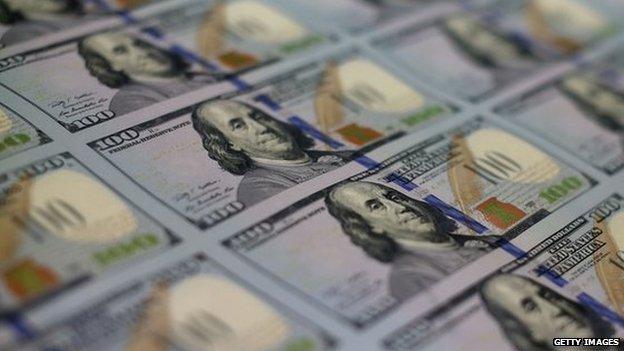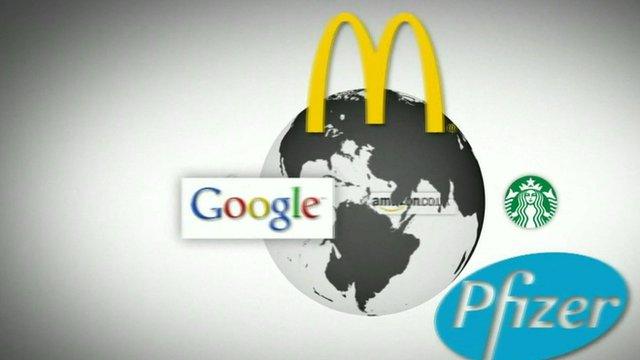The cat-and-mouse world of US tax
- Published

US companies are involved in chasing a number of headline-grabbing deals at the moment, with rationales that tie-ups would be good for the businesses.
Drugs giant Pfizer is looking to buy UK firm AstraZeneca in a multi-billion dollar deal, and General Electric (GE) is busy pursuing French engineering giant Alstom.
But could tax avoidance be one of the reasons US firms are so keen to buy foreign companies?
Pfizer's deal, for instance, would see it moving its top company to the UK for tax purposes.
US multinationals have big incentives to invest foreign funds abroad, according to tax campaigners.
The US has one of the highest rates of corporation tax in the world - a whopping 35%, compared with 21% in the UK, just 12.5% in Ireland, and zero in tax havens such as Bermuda and the Cayman Islands.
Keeping money offshore is therefore one way to avoid the high US tax rate.

Pfizer wants to move its top company to the UK to take advantage of a lower tax rate
'More efficient' structure
The proposed Pfizer deal would help the multinational use some of its $69bn pile of offshore cash, external, according to the Tax Justice Network.
"What seems quite clear is that tax avoidance has played an important part in starting the original [Pfizer] bid," Tax Justice Network executive director John Christensen says.
Pfizer told the BBC that there were strategic business reasons for the proposed deal, but admitted it would give "a more efficient tax structure".
The companies would potentially operate as "as [a] new, UK-domiciled combined company" that "would not subject AstraZeneca's non-US profits to US tax, which would be in the best interests of the combined company's shareholders".
In addition, UK companies are "subject to little or no tax on profits generated in non-UK jurisdictions when they are repatriated".
"Consequently, the current contemplated structure would place us on a more even competitive playing field and would again be in the best interests of the combined company's shareholders," Pfizer said.
Structural problem?
US corporations have billions sitting offshore that could be taxed if the money were brought back to the US, Mr Christensen says. For example, General Electric has around $108bn held offshore, according to Bloomberg., external

General Electric chief executive Jeffrey Immelt leaves the Elysee Palace after Alstom deal discussions with French President Francois Hollande
GE declined to comment on its tax arrangements or the Alstom negotiations.
However, a source close to GE told the BBC that the firm is not chasing the Alstom deal for tax reasons, but for business purposes.
In addition, the $108bn held overseas has been reinvested and is not held as cash, the source said, adding that while GE does have $57bn cash outside the US, that is held by GE Capital, which uses it for investments.
Commentators agree that the reason companies are so keen to invest abroad lies with the US tax system and the high tax rates it imposes.
As soon as companies try to bring profits back into the US, they may be liable for tax so they go to great efforts to keep them offshore.
"This prevents investment [coming] fully back into the US where it is needed," says Tax Foundation economist Kyle Pomerleau.
Tax avoidance 'games'
US multinationals are involved in a cat-and-mouse game with US tax authorities, and use some very creative strategies to minimise income tax payments, the Tax Justice Network says.
Common tax avoidance strategies include assigning intellectual property rights to foreign subsidiaries, and then paying the subsidiaries to use a brand, trademark, patent or licence.

Tax havens such as Bermuda add to incentives for US firms to keep their earnings offshore
"You charge an onshore subsidiary for the use of a brand, but the brand belongs to an offshore company," he says.
Foreign subsidiaries are also used to charge high management fees to a parent company.
"Offshore companies milk the onshore companies," he adds. "These are the kinds of games that are played."
In addition, multinationals load foreign acquisitions with tax deductable debt to move money offshore, he says
Keeping shareholders happy
Companies also use share buyback schemes as part of their strategy. Apple, which has tens of billions of dollars overseas, is in the curious situation of taking on debt for a share buyback scheme to placate shareholders back home missing out on dividends.
In a share buyback scheme, a company can pay a premium price to buy a limited number of shares from each shareholder.
"It's a way of keeping shareholders happy," economist and anti-poverty campaigner Richard Murphy says. "It's not profitable in the US to provide dividends."
A premium price has a positive effect on the value of the company's shares in general, which adds to shareholder contentment, Mr Murphy adds.

Apple, which makes billions in profits, has taken on debt to finance its share buyback programme.
Reform on the horizon?
Some estimates put the amount of US cash kept abroad, external at $1.5 trillion.
Nevertheless, multinational firms "would like to be able to bring money back to the US without paying a big tax", says Columbia Law School professor Michael Graetz.
And in fact some US corporations do opt to bring huge chunks of cash home.
Ebay recently said it would repatriate almost $9bn as "it would make more sense to have more cash in the US for mergers and acquisitions".
There are a number of efforts in the US and elsewhere to try to reform tax rules.
Republican congressman Dave Camp has been among US politicians attempting to introduce a draft tax reform act which aims to lower corporation tax.
The OECD is in the process of coming up with rules designed to tackle "base erosion and profit shifting", which involves companies using mismatches in tax rules to make profits "disappear" legally.
However, these efforts may take many years to come to fruition.
In the meantime, the cat-and-mouse game between multinationals and tax authorities continues.
- Published29 April 2014

- Published27 April 2014

- Published23 April 2014

- Published13 June 2013
